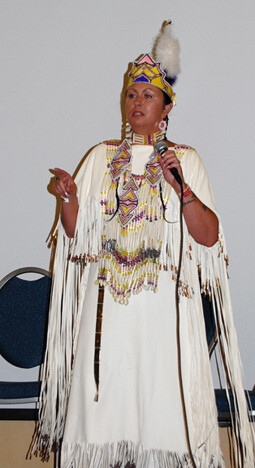
School opens up a 'place to know God'
UMCONNECTION STAFF
"Every place you go, God is already there," said Lyda Pierce, resident Northeast Jurisdiction missionary, who has traveled the globe. working for the past 19 years in Nicaragua, Guatemala and Honduras.
 Pierce attended the Baltimore-Washington Conference 2008 Cooperative School of Christian Mission, which met at the Gaithersburg Hilton Hotel July 24-27.
Pierce attended the Baltimore-Washington Conference 2008 Cooperative School of Christian Mission, which met at the Gaithersburg Hilton Hotel July 24-27.
In each of the Central American countries she and her husband, writer/photographer, Paul Jeffries, served, she said her role "has been to make space to know God."
In a focus group Saturday afternoon, one of seven 90-minute sessions on various topics including a review of General Conference, "Seeking Jerusalem," mission work with the General Board of Global Ministries and Katrina recovery, Pierce walked the focus group through a process she used to teach women's groups and others, mostly semi-illiterate, about theology. She used a modification of the Wesleyan quadrilateral with the words experience, context, faith and tradition.
"Theology is reflecting on our faith experiences," she said.
Kendra Neal, a young adult school teacher from Clinton UMC, was an enthusiastic participant, attending her first School of Christian Mission.
"As a first timer, I've seen beautiful women and heard witnessing and the Word of God and felt the love of Christians," she said.
Four simultaneous classes on "Giving Our Hearts Away: Native American Survival" engaged most of the nearly 200 participants in this first of two years for the topic. Other participants attended the second year of "Israel-Palestine," led by Jim Vitarello and the Rev. Monroe Wright.
Each of the four study leaders in the "Native American" classes had different approaches, but all four classes covered the same general topics: the interrelatedness between the indigenous peoples and their land, spirituality, the impact of Christianity, tribal sovereignty, the history and relationship of the U.S. government with the tribal peoples, the many issues tribes or nations face, such as gambling, poverty, violent crime, unemployment, environmental racism, and economic development.
"Among native people, community is a place and a way to live," said Mary Baldridge, leading one group. "Community is a value."
Rev. Carletta Allen's group discussed the gambling issue, particularly related to Maryland, by dividing into two parts, one taking the "for" side, the other "against."
"There's so much hypocrisy in the gambling issue," said Emily Tocknell , a young adult attending the school. "It's wrong in what it does to people , but I see many people, including United Methodists, going to casinos. We have to find ways to do things another way."
A strong voice from the "other" side said she'd lived in Arizona and saw many health clinics built from the Indian casinos, some in remote areas.
"The casinos being lifted up in the media aren't doing well for the most part," Allen said. "Somehow the Indians, like always, have gotten shafted." She mentioned that an exception was the Oneida tribe.
Two other groups were led by the Rev. Doris Warrell and Caroleann Myers.
Saturday evening the group celebrated with many Indian leaders, among them several chiefs of various tribes. The speakers, drummers and dancers came from AIITCO, the American Indian Inter-Tribal Cultural Organization, Inc., a non-profit organization based in Rockville, led by Chuck Tsinnie, a Dineh chief.
The tone for the day was set each morning with a spiritual growth study for all participants together, led by the Rev. Cynthia Belt.
"Who is left out? Whose voice is not heard?" she asked often as she led the study, "I Believe in Jesus."
One day she used the Apostle's Creed and the Nicene Creed as a basis. She explained that the creeds came about because of theological and political divisions in the church. Rome, under Emperor Constantine, made the final decision on which beliefs were acceptable.
"Our creeds define who we are -- and who we are not," said the Rev. Åntoine Love, who led music for the school.
As we recite the creeds, "who might be missing?" Belt asked over and over, leading the audience to think deeply about the people who attend services or do not because they don't "understand the language."
"The beauty of The United Methodist Church," she said, "is we don't have to prescribe to only one thing," one creed or system of beliefs as we answer "who do we say Jesus is?" Jesus is not just a corporate image or belief, but also an individual experience.

Login/Register to leave comment